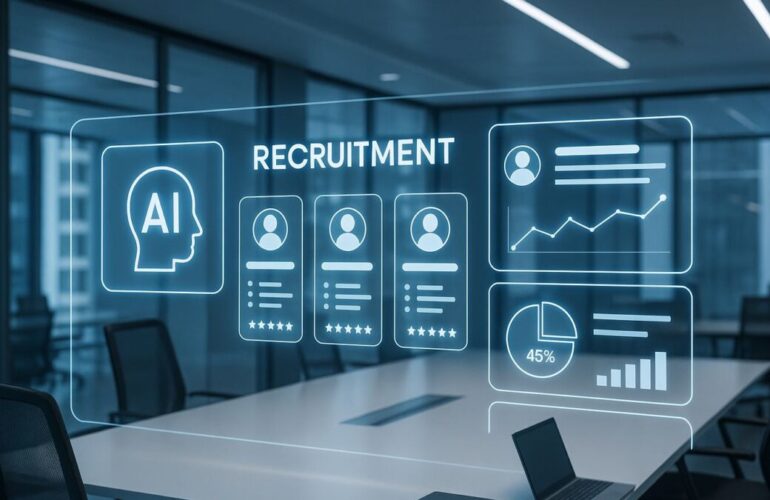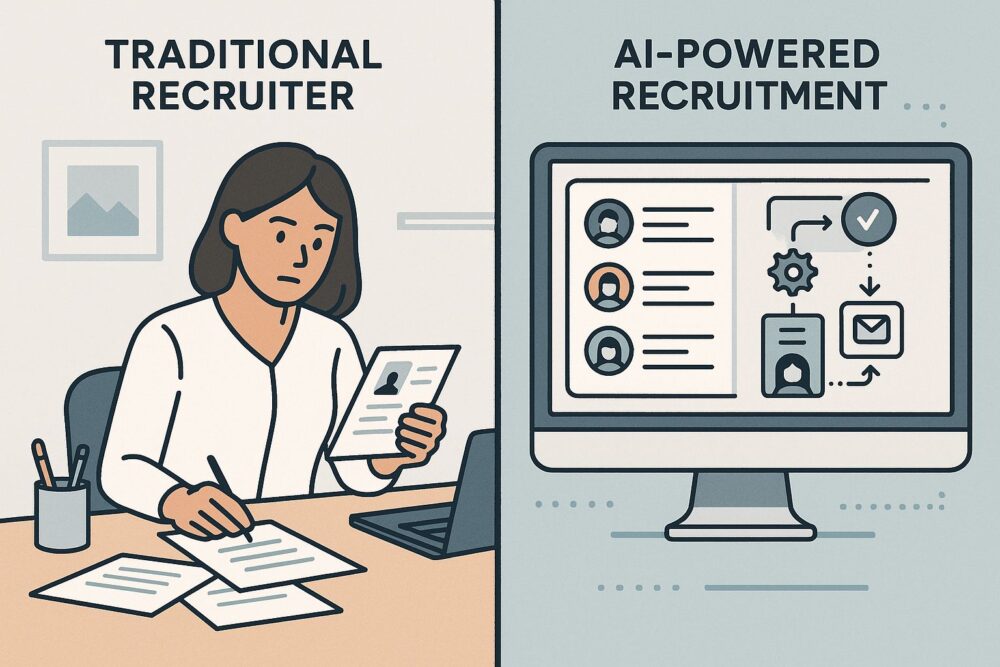How AI is Used in Recruitment: Smart Solutions 2025
How AI is Used in Recruitment – Smart Solutions in 2025. The landscape of talent acquisition is experiencing a revolutionary transformation as AI is used in Recruitment processes across organisations worldwide. 99% of surveyed hiring managers reported using AI in some capacity in the hiring process. 2025 AI in Hiring Survey Report | Insight Global, marking 2025 as the definitive year where artificial intelligence has become integral to modern recruitment strategies.
From screening thousands of resumes in minutes to predicting candidate success, the way AI is used in Recruitment is reshaping how organisations identify, engage, and hire top talent. This comprehensive guide explores the cutting-edge applications, benefits, and future implications of AI-powered recruitment solutions that are setting new standards for efficiency and effectiveness in talent acquisition.
Understanding How AI is Used in Recruitment Today
AI recruiting is the use of technology to streamline and automate parts of the talent acquisition process. Machine learning models can help you identify and shortlist top talent, automate routine tasks, streamline the recruitment workflow, and free recruitment managers from repetitive high-volume tasks. AI recruiting: revolutionising hiring and talent acquisition in 2025.
The way AI is used in Recruitment encompasses various sophisticated technologies, including natural language processing (NLP), machine learning algorithms, and predictive analytics. These tools work together to analyse vast amounts of candidate data, uncover patterns, and provide data-driven insights that enhance decision-making throughout the hiring process.
24% of companies use AI to hire talented employees, AI Recruitment Statistics 2025 (Worldwide Data & Insights), with this number rapidly expanding as organisations recognise the transformative potential of AI-powered recruitment solutions. The technology has evolved from simple keyword matching to sophisticated systems that can assess cultural fit, predict performance, and even identify passive candidates who weren’t actively job searching.
Key Areas Where AI is Used in Recruitment Processes
Resume Screening and Candidate Sourcing
One of the most impactful ways AI is used in Recruitment is through automated resume screening. When recruiting new employees, 58% of recruiters who use AI find it most useful for candidate sourcing AI Recruitment Statistics 2025 (Worldwide Data & Insights). AI-powered screening systems can process hundreds of applications in minutes, identifying qualified candidates based on specific criteria, skills, and experience levels.
These intelligent systems go beyond simple keyword matching, using natural language processing to understand context, assess transferable skills, and rank candidates based on their potential fit for specific roles. This automation allows recruiters to focus on high-value activities like relationship building and strategic planning.
Predictive Analytics for Hiring Success
Predictive analytics: This technology uses historical data to forecast a candidate’s potential performance and likelihood of staying in a role. By analysing resumes, skill sets, and social media presence, predictive analytics can help identify candidates who are not only qualified but also likely to thrive in the organisation. AI recruiting: revolutionising hiring and talent acquisition in 2025.
The sophisticated way AI is used in Recruitment through predictive analytics helps organisations make more informed hiring decisions, reducing turnover and improving overall quality of hire. These systems analyse patterns from successful employees to identify traits and characteristics that predict long-term success.
Conversational AI and Chatbots
AI-driven chatbots facilitate communication with candidates by answering questions, guiding them through the application process, and scheduling interviews. These tools enhance the candidate experience by providing timely information and supporting AI recruiting: revolutionising hiring and talent acquisition in 2025.
The implementation of conversational AI demonstrates how AI is used in Recruitment to create seamless, 24/7 candidate engagement. These intelligent assistants can handle initial screening questions, provide company information, and even conduct preliminary interviews, ensuring candidates receive immediate responses regardless of time zones or business hours.
Quantifiable Benefits of How AI is Used in Recruitment
Dramatic Time Savings and Efficiency Gains
According to 67% of hiring decision-makers, the main advantage of using AI in the recruitment process is its ability to save time AI Recruitment Statistics 2025 (Worldwide Data & Insights). The efficiency gains from how AI is used in Recruitment are remarkable, with 86.1% of recruiters saying AI makes the hiring process faster AI Recruitment Statistics 2025 (Worldwide Data & Insights).
Companies report 30–50% faster time-to-hire, significant cost savings, and improved quality of hire. AI Recruitment Trends 2025: How AI is Transforming Hiring when implementing AI-powered recruitment solutions. This acceleration allows organisations to secure top talent before competitors while reducing the burden on HR teams.
Cost Reduction and ROI
The financial impact of how AI is used in Recruitment is substantial. AI recruitment can reduce hiring costs by 30% per hire AI Recruitment Statistics 2025 (Worldwide Data & Insights), making it an attractive investment for organisations looking to optimise their talent acquisition budgets while improving outcomes.
It is predicted to grow to $1.35 billion in 2025 at a compound annual growth rate (CAGR) of 18.9%, and $2.67 billion in 2029 at a CAGR of 18.6% AI in Recruitment: The 2025 Clear Guide to Everything You Need demonstrates the massive market expansion and adoption of AI recruitment technologies.
Enhanced Candidate Experience
The way AI is used in Recruitment significantly improves the candidate experience through personalised interactions, faster response times, and streamlined application processes. 98% saw significant improvements in hiring efficiency via AI in things like scheduling interviews, screening resumes, and assessing skills. 2025 AI in Hiring Survey Report | Insight Global.
Advanced Applications: The Future of How AI is Used in Recruitment
Bias Reduction and Inclusive Hiring
According to the U.S. Department of Labour’s AI & Inclusive Hiring Framework, organisations are implementing AI tools designed to promote inclusive hiring practices and reduce unconscious bias. The framework guides how AI is used in Recruitment to create more equitable hiring processes while maintaining effectiveness.
Today’s advanced AI software features intelligent writing tools that can create job descriptions free of biased language. This means your recruitment ads should attract applicants from as wide a range of groups as possible. AI in Recruitment: The 2025 Clear Guide to Everything You Need.
Skills-Based Assessment and Matching
74% of hiring managers say that AI can assist in assessing the compatibility of an applicant’s skills with the position they’ve applied to. 73% said AI can help match candidates to other roles in the organisation. Candidates didn’t apply to the 2025 AI in Hiring Survey Report | Insight Global.
This sophisticated application shows how AI is used in Recruitment to move beyond traditional qualification-based hiring toward skills-first approaches that identify hidden talent and internal mobility opportunities.
Agentic AI and Autonomous Recruitment
With the rise of agentic AI, systems that not only recommend but also act, recruitment is entering a new era where workflows can run proactively. AI Recruitment Trends 2025: How AI is Transforming Hiring. This represents the next evolution of how AI is used in Recruitment, moving toward systems that can autonomously manage entire recruitment workflows with minimal human intervention.
Implementation Challenges and Considerations
Candidate Acceptance and Trust
66% of adults in the United States say they will not apply for a job that uses AI to help make hiring decisions, AI Recruitment Statistics 2025 (Worldwide Data & Insights), highlighting the importance of transparent communication about how AI is used in Recruitment processes. Organisations must balance automation with human touch points to maintain candidate trust.
71% of adults in the United States oppose using AI to make final hiring decisions, AI Recruitment Statistics 2025 (Worldwide Data & Insights), emphasising that while AI can enhance the recruitment process, final hiring decisions should remain with human decision-makers.
Ethical Considerations and Oversight
The responsible implementation of how AI is used in Recruitment requires careful attention to bias detection, algorithmic transparency, and compliance with employment regulations. The Federal AI Standards Coordinator provides guidance on AI standards and best practices that organisations should consider when implementing recruitment AI systems.
Strategic Implementation of AI in Recruitment
Getting Started with AI Recruitment Tools
Organisations beginning their journey with how AI is used in Recruitment should start with clear objectives tied to business impact. According to IQTalent’s 2025 report, organisations that align AI recruiting tools with clear objectives report up to a 48% increase in diversity hiring effectiveness and a 30 – 40% drop in cost-per-hire. How AI Is Changing Recruitment In 2025 | MSH.
Measuring Success andOptimisationn
The key to the successful implementation of how AI is used in Recruitment lies in continuous measurement and optimisation. Organisations should track metrics, including time-to-hire, cost-per-hire, quality of hire, and candidate satisfaction, to ensure AI tools are delivering expected outcomes.
The Future Landscape of AI in Recruitment
As we advance through 2025, the way AI is used in Recruitment will continue evolving with more sophisticated predictive capabilities, enhanced personalisation, and seamless integration across the entire talent lifecycle. 76% of companies predict that their organisations will implement AI technology within the next 12–18 months to stay competitive. The Ultimate 2025 AI Recruiting Guide: Save Time, Hire Smarter, Stay Ahead.
The future promises even more innovative applications, including voice analysis during interviews, real-time skills assessment, and AI-powered career coaching for candidates. Organisations that embrace these technologies while maintaining ethical standards and human-centred approaches will gain significant competitive advantages in the talent market.
The transformation of how AI is used in Recruitment represents one of the most significant shifts in human resources technology. By combining the efficiency of artificial intelligence with human insight and empathy, organisations can create recruitment processes that are faster, fairer, and more effective than ever before. The key to success lies in thoughtful implementation, continuous optimisation, and maintaining the human elements that build trust and create positive candidate experiences.

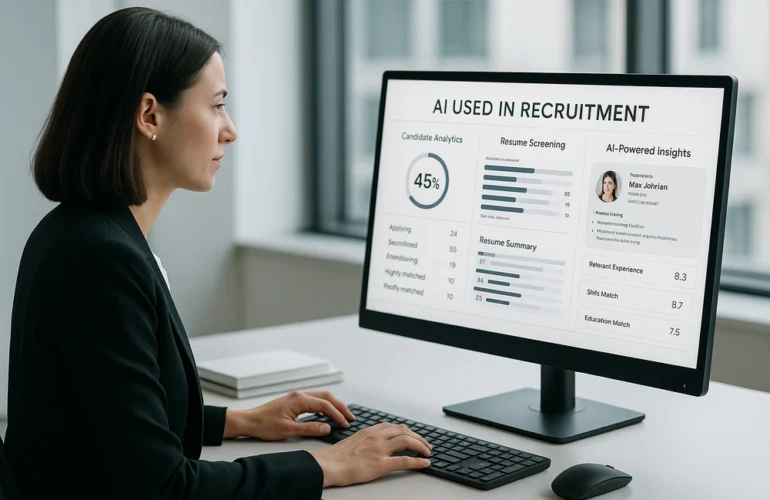
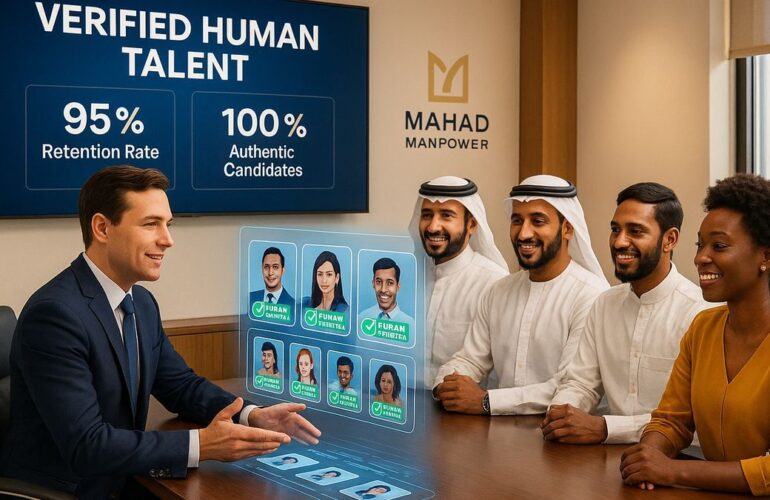
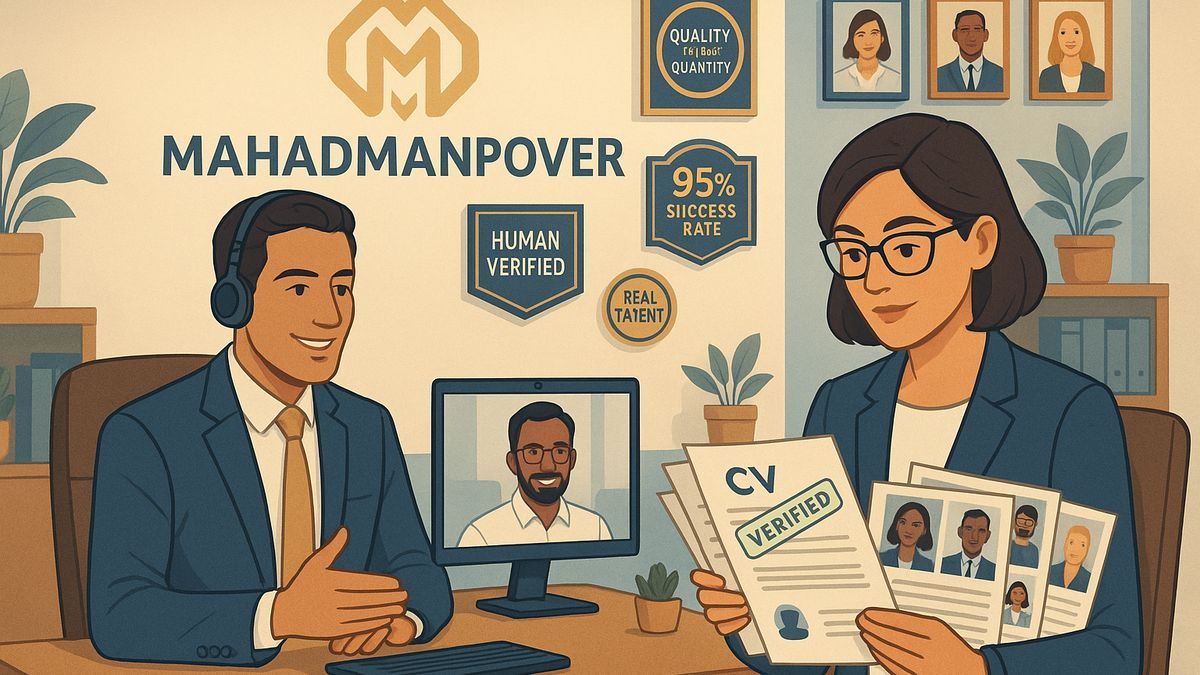 At MahadManpower, we’ve developed the industry’s most effective solution to combat AI job bot spam: human-verified, AI-enhanced recruitment that delivers quality over quantity.
At MahadManpower, we’ve developed the industry’s most effective solution to combat AI job bot spam: human-verified, AI-enhanced recruitment that delivers quality over quantity.